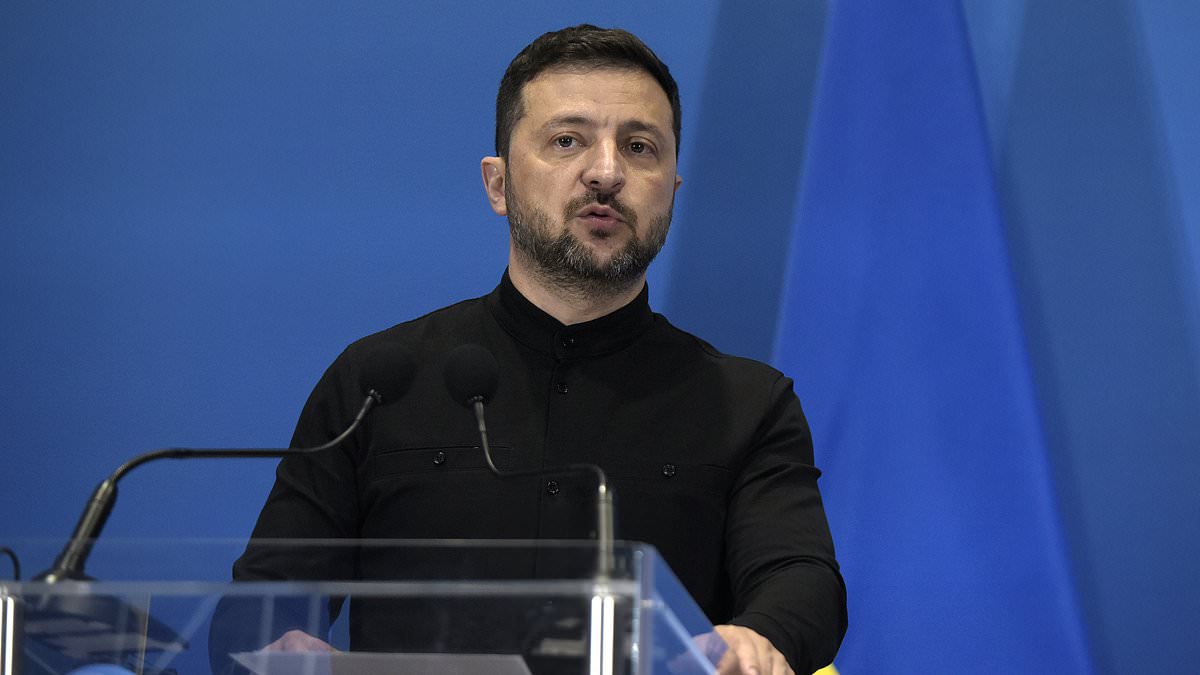Ukraine has proposed a fresh round of peace talks with Russia following weeks of relentless missile strikes, President Volodymyr Zelensky has said.
In his evening address to the nation, the Ukrainian leader said ‘everything should be done to achieve a ceasefire’ and that the pace of negotiations should increase.
It comes less than 24 hours after NATO was forced to scramble war planes over Poland in response to a fresh wave of attacks on key strategic cities in Ukraine.
Meanwhile, Moscow was also targeted by strikes for the third night in a row – with explosions heard across several of the city’s suburbs.
The proposed peace talks would take place next week and come after negotiations stalled in early June, Zelensky announced.
The previous two rounds of discussions in Istanbul between Moscow and Kyiv failed to make any progress towards the agreement of a ceasefire.
They instead resulted in yielding large-scale prisoner exchanges and deals to return the bodies of killed soldiers.
Speaking in his evening address on Saturday, Zelensky said: ‘The momentum of the negotiations must be stepped up.
Zelensky also reiterated his readiness to have a face-to-face sit down with Putin.
‘A meeting at the leadership level is needed to truly ensure peace – lasting peace,’ he said.
At talks last month, Russia outlined a list of hardline demands, including calls for Ukraine to cede more territory and to reject all forms of Western military support.
Kyiv dismissed them as unacceptable and at the time questioned the point of further negotiations if Moscow was not willing to make concessions.
The Kremlin, however, said it was ready to continue talks with Ukraine after US President Donald Trump gave Russia 50 days to strike a peace deal or face sanctions.
Trump also pledged to supply Kyiv with new military aid, sponsored by NATO allies, as its cities suffer ever-increasing Russian aerial attacks.
Moreover, earlier this month Trump announced he would send Patriot air defense system to Ukraine to bolster the country’s defence capabilities.
The decision came as the US-president blasted Putin as ‘two faced’, saying that ‘he talks nice, then bombs everybody’.
Trump said: ‘We will send them Patriots, which they desperately need, because Putin really surprised a lot of people.
‘He talks nice and then bombs everybody in the evening. But there’s a little bit of a problem there. I don’t like it.
‘We basically are going to send them various pieces of very sophisticated military equipment.
‘They are going to pay us 100 percent for that, and that’s the way we want it.’
Trump’s deployment of the missiles marked a U-turn from how he campaigned on an ‘America First’ platform.
Last night, Russia staged a five-hour missile and drone onslaught on the strategic city of Pavlohrad – in the worst attack the area has suffered during the three-year war.
A fire station in the city was destroyed, with damage to industrial enterprises and a five-story residential building.
Meanwhile, one woman was killed and three people were wounded after a nine-storey apartment block was struck in Odesa.
Putin, however, saw his capital Moscow targeted by strikes for the third night in a row following Donald Trump’s reported advice for Ukraine to pressure the Kremlin.
Videos showed a series of explosion across the city and in Dmitrov, drone debris damaged a high-voltage power line.
Explosions were also heard in the Moscow suburbs of Odintsovo, Solnechnogorsk, Istra and Zelenograd.
One eyewitness was heard saying: ‘There it flies! Shoot it down, damn it! Damn it, shoot it down! Yes! ****!’ Another said: ‘Damn, this is crazy.’
In Rostov, Ukrainian strikes caused massive train disruption on the Moscow–Rostov-on-Don main line, a key military supply route.
In response to the intense strikes on Ukraine, which involved more than 400 drones, NATO fighters were scrambled from military air bases.
‘Due to another attack by the Russian Federation targeting targets located in Ukrainian territory, air operations have commenced in our airspace,’ it was said in an announcement from the armed forces operation command in Poland.
‘Duty fighter pairs have been scrambled, and ground-based air defence and radar reconnaissance systems have been brought to the highest level of alert.’
The statement continued: ‘The measures taken are aimed at ensuring security in areas bordering the threatened areas.’
